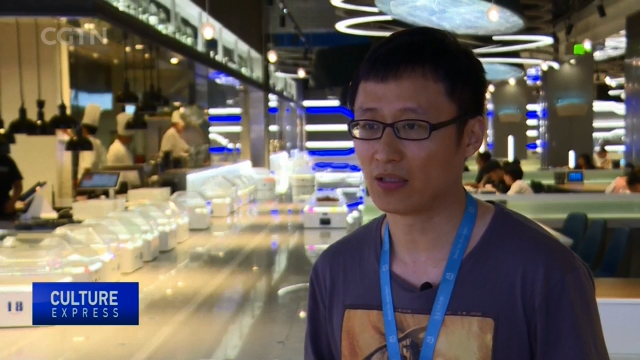
19:40, 20-Aug-2018
Restaurant Robotics: Automation arrives on Shanghai's dining scene
Updated
19:32, 23-Aug-2018
02:50

It's no secret that China is in the midst of a robotics revolution. Automated machines have long been helping shave labor costs in fields like manufacturing and logistics. But with robots starting to leave the factory floor and clocking in for shifts at kitchens and eateries, the country's restaurant-goers are now getting a taste of a whole new kind of dining experience. CGTN's Frances Kuo explains.
A quick glance at this Shanghai restaurant doesn't show anything unusual until you realize that waiters are nowhere in sight. At least the kind of waiters one normally thinks of. Here, the robots do the work.
CAO HAITAO, PRODUCT MANAGER HEMA ROBOT RESTAURANT "In a traditional restaurant, from queuing, to entering the restaurant, to seating and ordering, to the chef and serving food, it is all a series of steps to go through. With our digitized system, these steps can be performed in a closed circuit, for example, customers can order food before they have been seated."
And customers seem to like what the restaurant is dishing up.
MA YIWEN CUSTOMER "Selecting dishes and placing an order is all done through the app so it is quite convenient. The robots deliver the food, there are no traditional waiters serving, I think it's quite original. So these advantages make it really convenient and high tech."
MA SHENPENG CUSTOMER "Food is served much faster here than other restaurants, and it is also very hygienic, the ingredients are fresh from the supermarket here, that gives some assurance. And the price is very reasonable."
And the price is right for the restaurant as well -- Robots are cheaper than their human counterparts.
CAO HAITAO, PRODUCT MANAGER HEMA ROBOT RESTAURANT "Staff costs are getting higher and higher, and in Shanghai, a waiter can cost more than 14-hundred dollars a month."
And by keeping staff costs down -- the restaurant can pass along lower prices to consumers.
MA SHENPENG CUSTOMER "The price is very reasonable."
The restaurant is an initiative of Chinese E-commerce giant, Alibaba. Right next to the diner is a semi-automated supermarket. Shoppers order on a mobile App. The items are then delivered via conveyor tracks on the ceiling -- and sent to checkout.
Alibaba now has 57 of these supermarkets in the country -- all of which will eventually feature the Robotic restaurants. Experts believe China will see more automated services to help compensate for shrinking labor force.
The government estimates that after 2020, the labor supply will drop by 100 million every 15 years. But Beijing is trying to avoid job losses by bolstering its service sector -- instead of relying on manufacturing as China has in the past.
Though the cost of Robots may still be too high for widespread consumer use. Diners, like these, are happy to get a taste of their potential. FRANCES KUO, CGTN.

SITEMAP
Copyright © 2018 CGTN. Beijing ICP prepared NO.16065310-3
Copyright © 2018 CGTN. Beijing ICP prepared NO.16065310-3